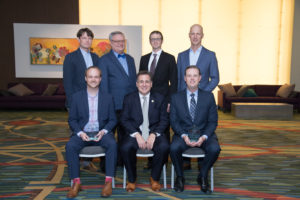ASA President James D. Grant, M.D., M.B.A., FASA, kicked off the PSH Scholarship Program Event on Monday morning by briefly tracing the Perioperative Surgical Home’s (PSH’s) rapid growth since its inception in 2014.
“Four years ago, no one knew what we were talking about when we mentioned the ‘Perioperative Surgical Home,’ but in a short period of time, we’ve managed to totally change the discussion,” Dr. Grant said.

ASA President James D. Grant, M.D., M.B.A., FASA (center), PSH Scholarship Review Board Chair Gary E. Loyd, M.D. (standing second from left), and PSH Learning Collaborative 2020 Medical Director Chris Steel, M.D. (behind Dr. Grant), with Curtis Koons, M.D., M.B.A. (sitting left), Wes J. Irwin, M.D., M.S. (sitting right), John Blackburn, M.D. (standing left), and James L. Johnson, M.D. (standing right).
The PSH Scholarship Event brought together representatives from the three inaugural scholarship winners along with industry sponsors. The scholarships are the first of their kind for ASA and speak to the level of support ASA and industry leaders have extended to the PSH model.
The scholarship-winning institutions included:
• Barton Health (South Lake Tahoe, California)
• Pikeville Medical Center (Pikeville, Kentucky)
• Tri-City Medical Center (Oceanside, California).
Industry supporters were:
• Edwards Lifesciences
• ePreop
• Fresenius Kabi
• Mallinckrodt Pharmaceuticals
• Masimo
• Merck
• PharMEDium
Curtis Koons, M.D., M.B.A., and John Blackburn, M.D., from Pikeville Medical Center, credited their scholarship for helping to streamline their institution’s bariatric and orthopedic surgery service lines. “We’re much better able to track our patients preoperatively, intraoperatively and postoperatively,” said Dr. Koons. “It’s like a machine.” One of the most beneficial aspects of their participation in the PSH Learning Collaborative overall, they said, was ready access to like-minded colleagues across the country.
Wes J. Irwin, M.D., M.S., indicated that Barton Health, a small community hospital, does 3,000 surgeries a year, including 300 TKA procedures, all of which go through their PSH model. He said his institution utilized some elements of the PSH previously, but the scholarship helped to cement the model. “It legitimized the process for our hospital about what we’re doing,” he said.
Dr. Irwin emphasized the importance of presurgical optimization, indicating that some surgeons did it while others didn’t. When he showed the scholarship to all stakeholders at his hospital, they said “that’s awesome… we didn’t even know you were doing that.” Now, buy-in has increased across the institution, with resultant improvements in care. “Our readmission rate is very low, and we’ve decreased our length of stay from three days to 1.8 days.”
James L. Johnson, M.D., said that getting leadership on board was one of the biggest challenges at Tri-City Medical Center. Thanks to continued support from his colleagues in PSH Learning Collaboratives, and now the recent PSH scholarship, he and his team were able to kick off a pilot in March 2018. They started with just seven patients, but now have 32 in the program. LOS has decreased significantly, and surgical site infection rates have dropped from 7 percent to 3 percent. Best of all, he said, patients love it.
“We put a little board up in our O.R. with patient remarks,” Dr. Johnson said. “Patients say things like ‘This is the best experience I have ever had’ and ‘I had absolutely no pain.’” He related the story of one surgeon who said a patient wanted to go to a competing hospital for surgery, but the surgeon told the patient about the PSH pathway and he was able to convince him to stay at Tri-City Medical Center. “It was a win-win for us,” he said. Dr. Johnson said the next big step in his PSH program is to get a co-management agreement in place so members from the full spectrum of care can be at the table together and on the same page.
PSH Learning Collaborative 2020 Medical Director Chris Steel, M.D., reminded participants that they were part of a history-making initiative.
“This is the first scholarship program like this in the ASA’s history,” Dr. Steel said. “You should be proud about this – and hats off to everyone for making it happen.” Even more important than the history, he said, were the lives being changed. “At our hospital, we had one TKA patient who was very overweight and smoked. We had them lose weight and quit smoking before the procedure. Afterword, they went to the surgeon and said thank you for the surgery, but said it was losing weight and stopping smoking that changed their life. This is all about optimization.”
Return to Archive Index